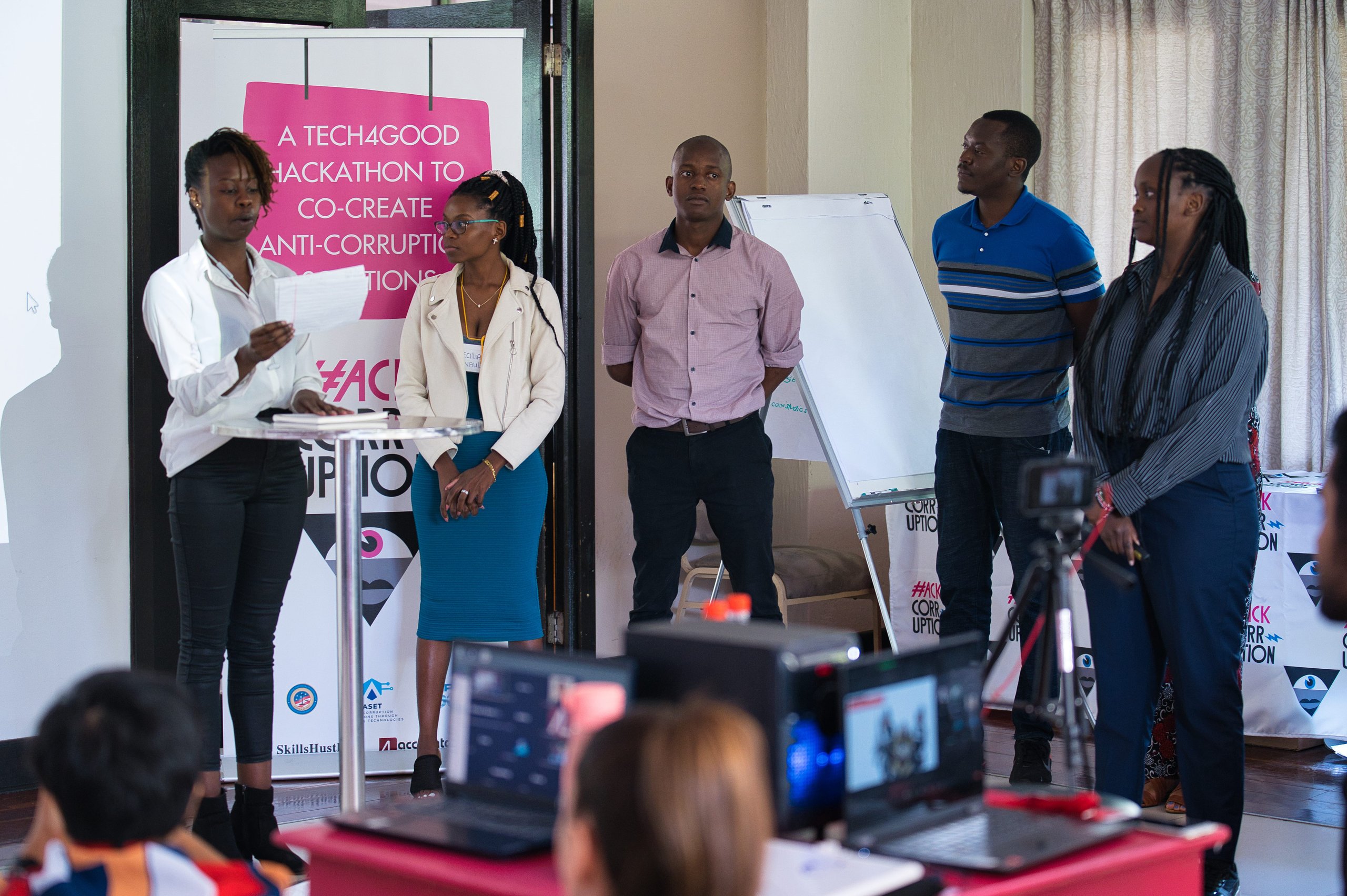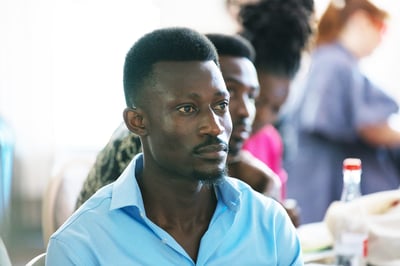NEWS
January 20, 2023

IN BRIEF
By Sara Hoenes In July 2022, Accountability Lab with support from the U.S. Department of State and in partnership the Center for International Private Enterprise (CIPE), launched HackCorruption, a people-powered hackathon designed to develop innovative solutions for greater transparency and accountability. The first regional event was held in Johannesburg, South Africa, and brought together 100 participants from six Southern and Central African countries. After a competitive judging process, five teams were selected as winners. Each winning team received project funding, continued training and mentorship, and an invitation to the HackCorruption Boot Camp. The event drew a particularly diverse group of [...]
SHARE
By Sara Hoenes
In July 2022, Accountability Lab with support from the U.S. Department of State and in partnership the Center for International Private Enterprise (CIPE), launched HackCorruption, a people-powered hackathon designed to develop innovative solutions for greater transparency and accountability. The first regional event was held in Johannesburg, South Africa, and brought together 100 participants from six Southern and Central African countries.
After a competitive judging process, five teams were selected as winners. Each winning team received project funding, continued training and mentorship, and an invitation to the HackCorruption Boot Camp.
The event drew a particularly diverse group of participants, who had expertise ranging from technology, coding, blockchain and AI to good governance and civil society. Additionally, the event attracted more than 40 percent female participation. This diversity strengthened the depth and quality of the winning solutions and created a more expansive network of tech and good governance enthusiasts across the six countries.
We caught up with two of the participants, Linda McLeod from Namibia and Eliud Luutsa from Kenya, after the bootcamp. Here’s what they shared about their experience at HackCorruption.
About the Hackers

Eliud Luutsa from Kenya
Eliud is a social innovator and a digital enthusiast who is passionate about advocacy and upskilling young Africans in entrepreneurship and leadership. He was born and raised in Bungoma County in the Western region of Kenya before moving to the capital Nairobi where he currently lives and works.
Eliud has a background in Financial Engineering from the Jomo Kenyatta University of Agriculture & Technology in Kenya and co-founded Centafrique Limited, a Kenyan company focused on strategy formulation and digital systems development for MSMEs. He also works at Africa Matters Initiative as the Schools Leadership Development Program Lead where he is building the next generation of social innovators, social entrepreneurs, and changemakers across Africa.
Linda McLeod is a research assistant under the AI Incubation Program at the University of Namibia in Windhoek and a Junior Advisor for Tech Entrepreneurship at Make-It Africa. With a Bachelors in Business from Namibia Polytechnic Institute and a Masters in Blockchain Technology from the University of Barcelona, she brought a unique perspective to her team.
Why did you decide to apply to participate in the Hackathon?
Eliud decided to apply because he felt passionate about changing the existing narratives around corruption in Kenya. “Corruption has crippled Kenya’s progress over the years and left many citizens feeling helpless,” he says. “You hear many of them saying, ‘Now this is too much, I wish someone did something!’ This was a chance for me to be that ‘someone’, and put my anger, technical skills and passion for advocacy into use by contributing to developing solutions.”
Linda applied to the hackathon after seeing a flier on social media. Her managing director supported her decision to apply. “I thought it would be a great opportunity to attain and learn new skills,” Linda shared.
Can you share a bit about your solution?

Linda McLeod from Namibia
Eliud’s team, InnoBid, tackled public procurement issues in Kenya and Namibia. “Our idea for InnoBid is an e-procurement system that seeks to automate the public procurement process, leveraging artificial intelligence and machine learning to detect and flag anomalies in price and beneficial ownership data to increase transparency,” he explains “Unlike the conventional approaches that are reactive, our solution is predictive and seeks to detect and flag corruption before it happens.”
Linda’s team, Transprocure, is an all-Namibian team with a wide range of skill sets that have been leveraged to develop a solution to Namibia’s paper public procurement process. “The aim is to assist public entities to award tenders through an open contracting and transparent procurement process,” she shares. “The project envisions co-creating solutions with various stakeholders whilst leveraging on technology to digitize the procurement process.”
Building Unlikely Networks
One of our primary goals in the HackCorruption program was to create a transnational network of tech4good enthusiasts who are working together to solve intractable corruption problems in their countries. Throughout the hackathon, our hackers were able to share challenges and opportunities across countries. Here is what Eliud and Linda had to share about connecting with fellow changemakers from across the continent.
Can you share a bit about the importance of meeting other tech entrepreneurs from the region?
“The most interesting thing for me, personally, was meeting people from around Africa,” Linda shared. “Hearing people’s stories and experiences – and that we really have the same goal. The mission is the same. We want to make Africa the best of the best. I think I will treasure that forever. I’ve never really had the opportunity such as this to meet other people from African countries and share experiences in a three-day program”
Eluid shared, “It was intriguing meeting other young digital enthusiasts in-person from across the continent who were equally passionate about solving corruption. I also loved collaborating with my team members and receiving feedback from mentors on how to improve our solution. I enjoyed learning about the different approaches one can take to combat different forms of corruption.”
Which learning sessions were the most impactful for you and why?
During the three-day boot camp, the AL Global, AL South Africa, and AL Mexico teams held learning sessions for the winning teams on a wide variety of topics, including business development, strategic storytelling, public sector engagement and government buy-in, stakeholder mapping, conscious capitalism, communications, branding, and tips for effective pitching.For both Eliud and Linda, storytelling added a new dimension to their work as social entrepreneurs.
“The storytelling workshop was very useful in helping us incorporate a story that the audience can connect and resonate with and eventually gain their trust,” Eliud shared.
For Linda, “Storytelling for many African cultures is second nature and, for many years, was a means to preserve culture, heritage, morals, and values.The workshop reminded us about the essence of how softer elements such as storytelling helps us relate to our audience and brings your product to life in relation to human experiences. It also assists in preserving your product in the minds of the audience through the process of storytelling – it further plays the role to make you relatable to the world.”
What’s Next?
Both Linda and Eliud plan to continue building their platforms with the support of Accountability Lab. They also shared how they plan to use the tools and networks gained through the Hackathon to tackle other issues they are passionate about.
Inspired by the HackCorruption Hackathon, Linda ran a successful hackathon in Namibia shortly after attending HackCorruption. “The theme of the hackathon was the merging of agriculture and technology (AgriTech) and it endeavored to bring together enthusiasts from both sectors. The idea was to pave, spark and inspire collaboration of the two sectors on the vast opportunities the agriculture ecosystem possesses. The exposure gained from attending the HackCorruption Hackathon allowed me to be more effective.”
Eliud also shared his plans to tackle additional challenges in his country with the support of his new network. “Personally, my goal is to continue building InnoBid into a fully fledged company that can tackle corruption in its different forms and spaces. I also plan to keep developing other tech4good solutions that will address pressing social issues in Africa, such as youth unemployment and the education divide.”
Learn more about HackCorruption and the winning innovations including Transprocure below:
Sara Hoenes is the Programs and Partnerships Manager for Accountability Lab
